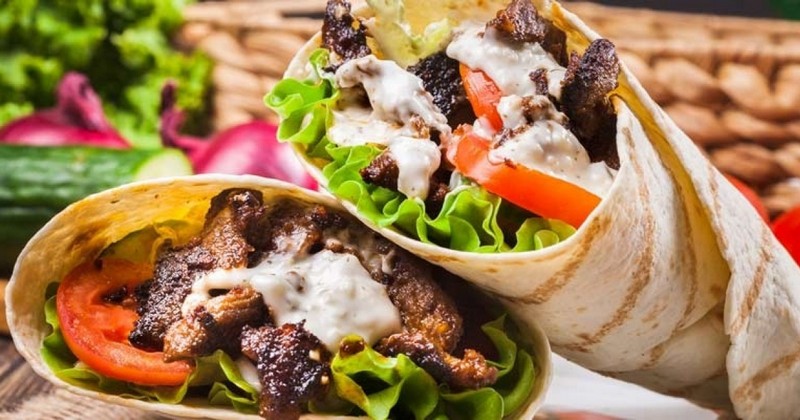What exactly is in a kebab? Nutritional properties and risks

Is this food of Turkish origin so harmful to health? We explain it to you.
Pizzas or hamburgers have always been pioneers in the ranking of fast food or junk food, but for some years now, kebab has also been in fashion in developed countries.
Döner kebab in Turkish, shawarma in Arabic or gyros in Greek is a spiced meat meal, often eaten on a bun. often eaten on a pitta bun with salad and sauce. Its taste may be delicious, but it is not exactly a healthy product.
It is also possible to eat this meat in a kind of wraps, and it is called dürüm.
In this article you can find some facts about this food and learn about its nutritional properties and the risks of eating kebab too often.
Poor nutrition in industrialized societies
The World Health Organization (WHO) has long been warning about the poor eating habits of some people and the growth of junk food restaurants, stating that this has become a public health problem that has, in many cases, not only aesthetic consequences for people but also poses a health risk. Obesity is a disease that is affecting industrialized societies, and its main cause is poor diet, rich in bad fats and calories.rich in bad fats and excessive calories, and a sedentary lifestyle.
In many cases, these bad habits begin as early as adolescence. Almost every young person has been out clubbing, drinking alcohol and ending the night with a kebab. Junk food has become normalized, and the laws are too tolerant of these foods. In fact, a British study recently found that industrial pastries from some chains such as Starbucks were ticking time bombs for our health, and coffees from some establishments such as Costa Coffee or KFC contained more sugar than a can of Coca-Cola. Nothing good for our health, so governments should do something to change this situation.
1000 to 2000 calories per kebab
Kebabs are highly popular nowadays, and this was confirmed by the fast food company justeat.com, because according to a survey of their customers "they are a cheap, delicious and very satiating delicacy". Kebabs are a traditional Turkish dish, which can be found throughout the Middle East and neighboring countries. Its appearance invites consumption, with the thin slices of lamb, chicken or beef meat being cooked with a vertical rotisserie that is rolled, and commonly served in garlic sauce or hot sauce in Europe, although in Greece they can be served with yogurt sauce or teriyaki sauce. Döner means to roll in Turkish, gyros and shawarma mean the same thing in their respective languages.
The doner kebab is not at all healthy, at least the one consumed in the West., and according to a study conducted by Geoffrey Theobald, the kebab can contain up to 1000-2000 calories per unit. Accompanied by fries and a Coke, it would still be much more. The author of this investigation affirms that "these data are really worrying" and, in addition, he concludes that "at nutritional level this food does not contribute anything good for our organism".
This study was conducted on 494 samples of kebabs in 76 municipalities, and the author states that the reported levels of salt, calories and saturated fat are simply outrageous.
What is in kebab meat?
Kebab meat may have a great taste thanks to the spices it contains, but the meat we often consume as lamb, beef or chicken, in reality often contains offal from these animals and other types of meat. and other types of meat. This is what was found by a British study of Commercial Standards that was published in the English newspaper Daily Mail, since the results revealed that kebabs do not always contain the meat that is indicated on the label of the suppliers. In fact, 15% of the cases the meat was not all lamb as on the label, but contained beef.
Worse still, even in 6 of the cases studied they found pork, something that goes against the Muslim religion. In addition, South Asian individuals do not eat beef either because they consider cows to be a sacred animal. Apparently, these issues arise from the manufacturers, so the outlets seem to be blameless for the content of kebab meat.
Why are they unhealthy? Risks
Kebabs are a very unhealthy food, and the same study found that they contain extremely high levels of salt.. The results suggest that one contains 14.7 grams of salt, more than double the daily amount which is 6 g. As for the fat content, it is also very high at 117.2 g, which is well above the recommended daily allowance of 95 g for men and 70 g for women.
As Geoffrey Theobald, tells the Daily Mail, "We can't consider kebabs as part of a healthy diet, because the health consequences are negative." "While some people may think it is a sensible and light option, kebabs contain a lot of calories and promote overweight when they are consumed frequently and the person has an inactive lifestyle". Regarding the misrepresented meat, Theobald explains, "It is totally unacceptable for people who have certain beliefs to be consuming foods that go against their principles."
More nutritious foods
Logically, kebab is not among the most nutritious and healthy foods we can consume. If you want to know which foods are best for our organism, you can read our article, "What are the 14 most nutritious foods that exist?"
(Updated at Apr 13 / 2024)